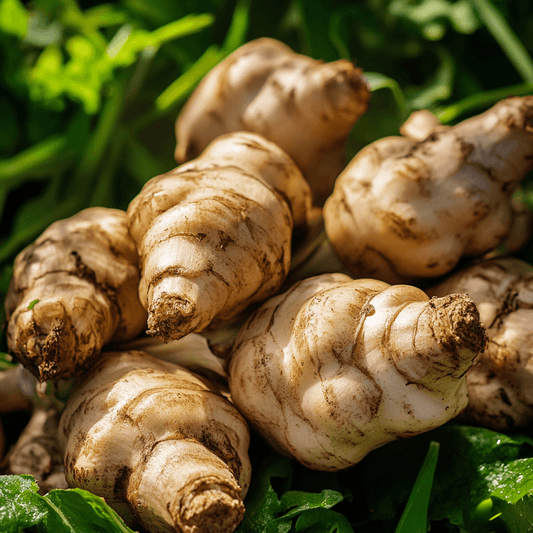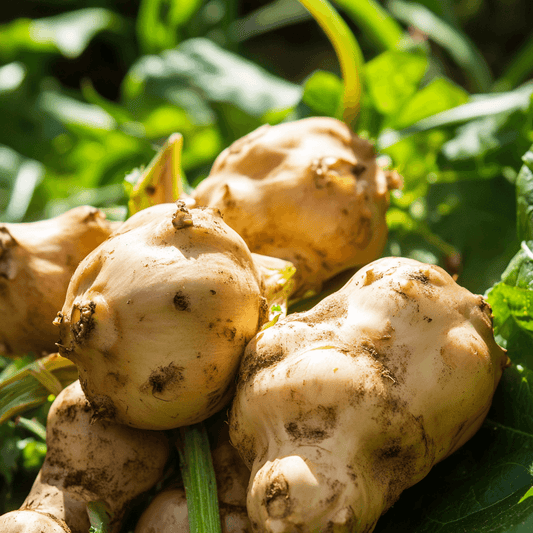If you're looking for an easy-to-grow, unusual vegetable, consider Jerusalem artichokes. These hardy plants are versatile, nutritious, and can add an intriguing twist to your garden and table. Let’s explore what makes Jerusalem artichokes unique, how to grow and manage them, and some delicious ways to prepare them.
What Are Jerusalem Artichokes?
Jerusalem artichokes (Helianthus tuberosus), also known as sunchokes, are actually sunflowers with tuberous, edible roots. These perennials can grow up to 10 feet tall and produce vibrant yellow flowers that resemble traditional sunflowers. The roots, which look like small, knobby potatoes, are packed with nutrients and are particularly valued for their low glycemic impact, making them a great choice for diabetics.
How to Grow Jerusalem Artichokes
Plant Jerusalem artichoke tubers in spring, and they’ll do most of the work themselves. Hardy to USDA Zone 2, these plants thrive in the cooler regions of the United States. For optimal growth, choose a sunny spot with well-drained soil and good tilth. Once established, Jerusalem artichokes are vigorous growers and require minimal maintenance. Their strong growth habit means they can even outcompete weeds, making them ideal for gardeners seeking a low-maintenance crop. The plants produce tubers throughout the growing season. You can dig them up as needed during the summer or wait until after the first frost, when the tubers are at their sweetest. Jerusalem artichokes can be invasive, however, so managing their spread is important.
Tips to Control the Spread of Jerusalem Artichokes
While Jerusalem artichokes are prolific and resilient, their enthusiastic growth can lead them to take over your garden if left unchecked. Follow these tips to manage their spread. Remove flowers before they go to seed by snipping off the yellow blooms and enjoy them in floral arrangements. Dig up most of the tubers in late fall. In regions with mild winters, continue harvesting through the colder months but ensure you remove as many tubers as possible by spring. Grow Jerusalem artichokes in a raised bed or an isolated area to contain their growth.
Nutritional Benefits of Jerusalem Artichokes
One of the unique features of Jerusalem artichokes is their inulin content. Unlike potatoes, which convert to glucose during digestion, Jerusalem artichokes convert to fructose. This makes them a great alternative for people managing diabetes or looking to lower their starch intake. Rich in fiber and essential nutrients, they are a healthy addition to any diet.
How to Prepare Jerusalem Artichokes
Jerusalem artichokes are as versatile in the kitchen as they are hardy in the garden. Simply scrub the tubers clean with a vegetable brush and slice them thin. Their crisp texture is reminiscent of water chestnuts, making them a delightful addition to salads. Preserve the tubers by pickling them with turmeric and mustard seeds for a tangy, flavorful treat. Prepare them like potatoes for a nutty, slightly sweet flavor with a fluffy texture. Blend cooked Jerusalem artichokes into creamy soups or purees for a comforting and nutritious dish. Their culinary versatility and health benefits make Jerusalem artichokes a favorite among gardeners and food enthusiasts alike.
Why Choose Jerusalem Artichokes for Your Garden?
If you’re new to gardening or looking for a low-maintenance, perennial vegetable, Jerusalem artichokes are an excellent choice. They’re highly adaptable, thriving even in poor soil conditions, and their hardy nature makes them a reliable crop. Plus, their ability to return year after year means you’ll enjoy fresh, homegrown produce without the need to replant.
A Few Words of Caution
Because Jerusalem artichokes can spread aggressively, it’s essential to stay on top of their growth. Harvest thoroughly and avoid leaving tubers in the ground if you don’t want them to reemerge in the spring. Some gardeners grow them in containers or designated plots to prevent them from overtaking other crops.
Get Started with Jerusalem Artichokes Today
Whether you’re drawn to their ease of cultivation, nutritional benefits, or unique flavor, Jerusalem artichokes are a fantastic addition to any garden. By following proper planting and maintenance techniques, you can enjoy a bountiful harvest while keeping their growth under control.
Experiment with different recipes to fully appreciate the versatility of this remarkable vegetable. Jerusalem artichokes are a wonderful way to diversify your garden and your plate, providing a healthy, delicious crop that’s easy to grow and care for. Embrace the opportunity to try something new and discover why so many gardeners and chefs alike love these versatile tubers.
Jerusalem Artichoke Resource Area
Growing & Care Guides
-
Jerusalem Artichoke Growing Guide
Everything you need to know to successfully plant and cultivate Jerusalem artichokes. -
Jerusalem Artichokes 101
An essential primer introducing Jerusalem artichokes—covering basics from what they are to planting tips. -
Managing Invasiveness in the Garden
Practical tips to control and contain Jerusalem artichokes, which can be vigorous growers. -
Companion Planting with Jerusalem Artichokes
Discover compatible plants and strategic pairings to enhance growth and garden harmony. -
Container Cultivation of Jerusalem Artichokes
A guide to growing Jerusalem artichokes successfully in pots or containers when garden space is limited.
Shop Jerusalem Artichokes
-
Buy Jerusalem Artichoke Crowns
Start your own crop with high-quality Jerusalem artichoke crowns, available now.






1 comment
The ones I’ve grown (with limited success – too far north) have spread via tubers left in the ground.
Am going to give them another try by planting them early indoors in grow bags and then moving the bags outside after last frost when temps warm.
Using Wal Mart shopping bags to grow in – at .50 each they are cheap, work well, and are reusable…fwiw.